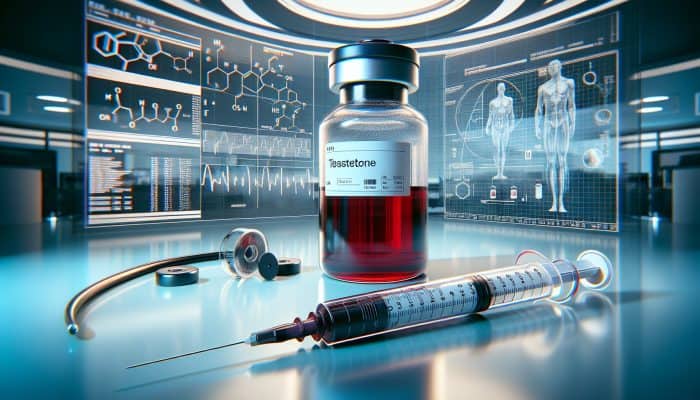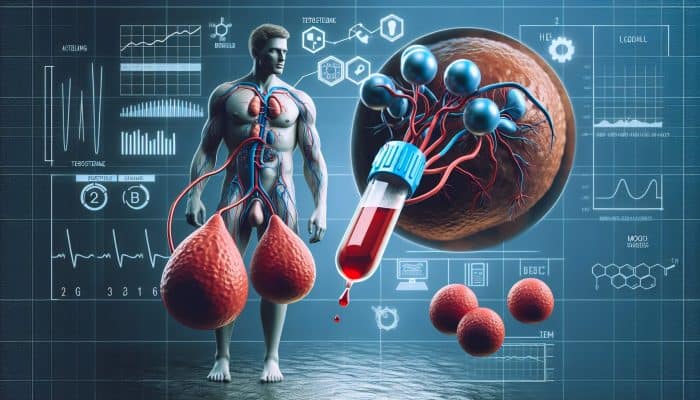Your Complete Resource for Testosterone Blood Testing: Insights and Significance Explained
Decoding the Elements and Procedure Involved in Testosterone Blood Testing

A testosterone blood test serves as a vital medical evaluation that aims to ascertain the concentration of testosterone in your bloodstream. This essential test yields invaluable insights into your overall hormonal health and well-being. The hormone testosterone is instrumental in various physiological processes, including the development of male characteristics, reproductive health, and maintaining vitality and energy. By assessing testosterone levels, healthcare professionals can identify potential hormonal imbalances that might result in various health complications, allowing for timely and customised interventions that cater to individual health requirements.
This critical test is performed in a clinical setting where a qualified healthcare provider collects a small blood sample from the patient. The results obtained from this test are crucial for determining whether your testosterone levels fall within a healthy range or if further diagnostic measures are necessary. For individuals currently undergoing treatment for hormonal disorders, monitoring testosterone levels is essential for evaluating the effectiveness of their ongoing management strategies and making any necessary adjustments.
 Recognising the Critical Role of Testosterone Testing for Your Overall Health
Recognising the Critical Role of Testosterone Testing for Your Overall Health
Your healthcare provider may recommend a testosterone test if you experience symptoms that are often associated with low testosterone levels. Common indicators include a noticeable decline in libido, persistent fatigue, mood swings, and difficulties in concentrating. Furthermore, many individuals may notice physical changes, such as reduced muscle mass or an increase in body fat. Acknowledging these symptoms is crucial, as they can significantly impact your overall quality of life and well-being.
In men, diminished testosterone levels can lead to severe health complications, including osteoporosis and an increased risk of cardiovascular issues. Although women typically have lower testosterone levels, imbalances can still pose significant health challenges. Therefore, determining whether testosterone levels are contributing to these symptoms is essential for implementing effective treatment. Early detection can enable timely interventions that ultimately enhance your overall health and quality of life, allowing for better management of any underlying conditions.
Key Preparatory Steps for Your Testosterone Blood Testing
Proper preparation for a testosterone blood test is essential for ensuring the accuracy and reliability of the results. Typically, your healthcare provider will advise you to fast for a certain period before the test. This usually means abstaining from all food and beverages, except for water, for approximately 8 to 12 hours prior to the blood draw.
Additionally, it may be necessary to temporarily discontinue certain medications to prevent any interference with hormone levels. Open communication with your healthcare provider regarding your current medications and overall health status is vital. Following your healthcare provider’s instructions closely will significantly enhance the accuracy of your test results, which are critical in determining the next steps in your treatment plan should a hormonal imbalance be identified.
Identifying Reliable Testosterone Blood Testing Facilities in Buxton

Local Healthcare Clinics in Buxton Providing Testosterone Testing Services
Buxton boasts several local healthcare facilities that offer testosterone blood tests. It is crucial to select a reputable clinic to ensure you receive high-quality care and accurate test results. Here is a list of some prominent clinics in Buxton:
- Buxton Medical Practice
- Peak Health Clinic
- Buxton Health Centre
- Springfield Health Centre
- Buxton Community Hospital
- High Peak Medical Practice
Each of these clinics employs qualified healthcare professionals who can guide you throughout the testing procedure. Before attending your appointment, it is advisable to confirm whether the clinic operates on a scheduled appointment basis or accepts walk-in services. Additionally, some clinics may offer specialised services tailored to specific patient demographics, so it is beneficial to inquire about their offerings to identify the best fit for your individual health needs.
Your Appointment Experience: What to Expect During Testosterone Testing
Upon arriving at a clinic for a testosterone blood test, you can anticipate a straightforward process that is usually quick and efficient. Clinic staff will typically welcome you and request that you complete initial paperwork detailing your medical history and any symptoms you may be experiencing. This step ensures that the healthcare professionals have a comprehensive understanding of your health background.
A qualified healthcare professional will then escort you to a private area designated for blood sample collection. Generally, a small amount of blood is drawn from your arm, and the procedure is typically swift, causing minimal discomfort. After the sample has been successfully collected, you are free to resume your daily activities while awaiting your test results, which will provide valuable information regarding your hormonal health.
Understanding the Timeline for Receiving Your Testosterone Test Results

After completing a testosterone blood test, you can generally expect to receive your results within several days to a week. The exact timeframe may vary based on the clinic’s processing capabilities and the laboratory’s current workload. Some clinics may offer expedited results through online patient portals, while others might require you to return for a detailed discussion of your results with a healthcare professional.
It’s crucial to remain patient during this waiting period, as test results are essential for determining your health status. Once your results are ready, your healthcare provider will interpret their significance in relation to your overall health and suggest potential next steps if any imbalances are identified. Understanding your results is vital, as they can significantly influence your ongoing treatment plan and overall well-being moving forward.
Expert Perspectives on the Importance of Testosterone Blood Testing in Buxton
Real-Life Testimonials Showcasing the Benefits of Testosterone Testing in Buxton
Numerous case studies from local healthcare providers in Buxton highlight the positive outcomes associated with testosterone testing in improving patients’ quality of life. One significant case involved a middle-aged man who suffered from extreme fatigue and mood variations, which he initially attributed to work-related stress. Following a testosterone blood test that indicated low hormone levels, targeted treatment not only elevated his testosterone but also revitalised his energy levels and improved his overall mood and emotional stability.
Another illustrative case featured a woman who reported a decrease in libido and ongoing feelings of malaise. After her healthcare provider suggested a testosterone test, the results indicated a hormonal imbalance. Through appropriate interventions, including lifestyle modifications and hormone therapy, she experienced a remarkable enhancement in her sexual health and general vitality, demonstrating the transformative effects of addressing hormonal issues.
- Case Study 1: A middle-aged man with fatigue and mood swings benefited from treatment that boosted his energy levels.
- Case Study 2: A woman experiencing low libido saw effective hormonal treatment that restored her vitality.
- Case Study 3: A young athlete facing performance issues discovered targeted therapy through testosterone testing.
- Case Study 4: An elderly patient with osteoporosis experienced improved bone density through testosterone therapy.
These compelling case studies underscore the significance of monitoring testosterone levels, illustrating how timely diagnosis and effective treatment can lead to substantial enhancements in health and quality of life for individuals facing hormonal challenges.
Identifying External Influences That May Affect Your Testosterone Levels
Understanding the various factors that can impact testosterone levels is crucial for accurately interpreting your test results. Age stands out as one of the most significant factors; testosterone levels typically peak during young adulthood and gradually decline with age. Lifestyle choices, including diet and exercise, also play a pivotal role, as poor nutrition and a lack of physical activity can negatively affect hormone production, leading to hormonal imbalances.
Medical conditions such as obesity, diabetes, and certain hormonal disorders can profoundly influence testosterone levels. Additionally, psychological factors, including chronic stress and anxiety, can result in fluctuations in hormone levels. Recognising these influences provides essential context for reviewing your testosterone test results, enhancing your overall comprehension of your health and enabling you to make informed decisions regarding your well-being.
Accurately Interpreting Your Testosterone Test Results
Your testosterone test results are typically expressed in nanograms per decilitre (ng/dL). Normal testosterone levels can vary considerably based on age and sex; for adult males, typical levels range from 300 to 1,000 ng/dL, whereas females generally exhibit levels between 15 and 70 ng/dL. Understanding these ranges is essential for accurately interpreting your results and evaluating your hormonal health.
Additionally, factors such as the time of day when the test is conducted can influence results, as testosterone levels can fluctuate throughout the day. If your results fall outside the established normal range, your healthcare provider will assist you in understanding the implications and discuss potential next steps, which may include further testing or treatment options tailored to your individual circumstances and health needs.
Exploring the Procedure of a Testosterone Blood Test
The Journey of Your Blood Sample from Collection to Analysis
Once your blood is drawn for a testosterone blood test, the sample is dispatched to a laboratory for comprehensive analysis. Expert laboratory technicians will utilise advanced testing methodologies to measure testosterone levels accurately. The results are meticulously compiled, analysed, and returned to your healthcare provider, who will review them with you in detail to provide insights and recommendations based on your hormonal health.
This laboratory processing typically takes several days, contingent upon the facility’s operational workload and specific procedures. Notably, some clinics may have in-house laboratories, which can expedite the testing process and provide faster results. The accuracy of these tests is paramount, as they inform subsequent steps in your treatment or management plan, ensuring you receive the most effective care possible.
Understanding Standard Testosterone Level Ranges: What to Expect
Normal testosterone levels can fluctuate significantly based on several factors, including age and sex. For adult males, the generally accepted normal range is between 300 and 1,000 ng/dL. In contrast, females typically exhibit much lower levels, ranging from approximately 15 to 70 ng/dL. Understanding these standard ranges is essential for accurately interpreting your results and determining whether your testosterone levels fall within a healthy range.
Age-related declines in testosterone levels are common, with levels peaking in early adulthood and gradually decreasing thereafter. It is crucial to compare your results against these benchmarks to ascertain whether your testosterone levels are within an acceptable range. If your testosterone levels are outside these norms, it may indicate the need for further evaluation or treatment, which your healthcare provider can discuss in detail to ensure you receive appropriate care.
Requesting a Testosterone Test on Your Own: Important Considerations
Indeed, you have the option to independently request a testosterone test from your general practitioner or a private clinic in Buxton. However, it is advisable to first discuss your symptoms and concerns with a healthcare professional. This ensures a personalised approach to your health, addressing any underlying issues that may not be immediately apparent. A healthcare provider can help determine whether a testosterone test is appropriate based on your medical history and current health status.
While self-requested testing is feasible, having the context provided by a healthcare professional can lead to a more comprehensive healthcare experience. They can assist in accurately interpreting the results and recommending suitable next steps, making the process significantly more beneficial for your overall health and well-being.
Essential Guidelines for Preparing for Your Testosterone Test
Proper preparation for a testosterone blood test is crucial to achieving accurate and reliable results. Generally, fasting is recommended, meaning you should refrain from consuming anything other than water for at least 8 to 12 hours before the test. This practice helps eliminate any variables that could potentially influence testosterone levels and ensures a clearer picture of your hormonal health.
Furthermore, it is imperative to inform your healthcare provider about any medications you are currently taking, as certain prescriptions can interfere with hormone levels. Your healthcare provider will provide specific instructions tailored to your individual circumstances. Adhering closely to these guidelines will help ensure the reliability of your results, facilitating effective diagnosis and treatment if deemed necessary.
The Benefits of Regular Testosterone Testing: What You Should Know
Health Advantages Linked to Monitoring Testosterone Levels
Regular monitoring of testosterone levels offers numerous health benefits that can significantly impact your overall well-being. By identifying hormonal imbalances early, individuals can receive prompt treatment that enhances their health outcomes. For instance, recognising low testosterone levels can lead to interventions that increase energy, elevate mood, and alleviate symptoms associated with hormonal deficiencies, improving daily functioning.
Moreover, regular testing allows healthcare providers to customise treatment plans effectively to meet individual needs and preferences. With precise and ongoing assessments, healthcare providers can adjust therapies as needed, ensuring patients receive the most suitable care tailored to their unique health requirements. This proactive approach can considerably enhance the quality of life for many individuals dealing with hormonal issues, fostering a more balanced and fulfilling lifestyle.
Understanding the Influence of Testosterone Levels on Overall Well-being
Testosterone plays a crucial role in various aspects of well-being, impacting physical and mental health. It is closely linked to muscle mass, bone density, and sexual function. Maintaining optimal testosterone levels can enhance physical performance, support bone health, and improve sexual function, ultimately leading to a more fulfilling and active lifestyle.
In addition to its physical health benefits, testosterone is also vital for mental health. Low testosterone levels can be associated with symptoms of depression, fatigue, and reduced motivation. Therefore, keeping testosterone levels within a healthy range can contribute to a balanced mental state, an uplifted mood, and improved overall well-being, positively influencing various aspects of life and enhancing personal and professional relationships.
Investigating the Connection Between Testosterone and Cardiovascular Health
Emerging research suggests that optimal testosterone levels may have a favourable influence on heart health. Some studies indicate that individuals with adequate testosterone levels could experience a lower risk of cardiovascular issues. However, the relationship between testosterone and heart health is complex, necessitating further investigation to validate these findings and understand the underlying mechanisms.
It is essential to approach this topic holistically, considering lifestyle factors such as diet, exercise, and overall health. While maintaining healthy testosterone levels may positively impact heart health, it should be viewed as just one component of a comprehensive health strategy that includes regular medical check-ups and a balanced lifestyle for optimal results.
Can Monitoring Testosterone Levels Improve Fertility Outcomes?
Tracking testosterone levels can significantly aid in identifying issues that may affect sperm production and, consequently, male fertility. Low testosterone levels can impair the body’s ability to produce adequate sperm, leading to challenges when attempting to conceive. Regular testing can help pinpoint these issues early, allowing for timely interventions that could enhance fertility outcomes and increase the chances of conception.
For couples trying to conceive, understanding testosterone levels can inform treatment options and strategies. Proper management of testosterone levels can support healthy sperm production, thereby increasing the likelihood of successful conception. Collaborating with healthcare providers throughout this process ensures that appropriate measures are taken to optimise fertility potential, paving the way for healthier family planning.
Effective Strategies for Optimising Testosterone Levels in Buxton
Practical Recommendations for Successfully Managing Your Testosterone Levels
After receiving your testosterone test results, there are numerous actionable steps you can take to effectively manage and optimise your testosterone levels. Initiating a conversation with a healthcare professional to review your results is the first essential step. They will provide personalised recommendations tailored to your unique health situation and medical history.
In conjunction with professional advice, implementing lifestyle changes can greatly influence hormone management and overall health. Incorporating regular physical exercise, particularly resistance training and cardiovascular workouts, can naturally elevate testosterone levels. A balanced diet rich in healthy fats, proteins, and essential vitamins and minerals is also crucial for maintaining hormonal balance. While supplements can be beneficial, they should be discussed with a healthcare provider to ensure safety and effectiveness, preventing potential negative interactions.
Identifying Lifestyle Modifications to Enhance Testosterone Levels
To maintain healthy testosterone levels, making beneficial lifestyle changes can be highly effective. Regular physical activity is one of the most impactful methods; engaging in resistance training and high-intensity interval training (HIIT) can promote testosterone production. Additionally, maintaining a healthy weight through a well-balanced diet and consistent exercise is crucial, as excess body fat can adversely affect hormone levels and overall health.
Moreover, ensuring adequate sleep and managing stress levels are vital components of hormonal health. Chronic stress can lead to elevated cortisol levels, which may inhibit testosterone production. Techniques such as mindfulness, yoga, and meditation can help mitigate stress and enhance sleep quality, thereby contributing to hormonal balance and overall well-being.
Expert Recommendations for the Importance of Follow-Up Testosterone Testing
Experts strongly advocate for regular follow-up testosterone tests to monitor changes in hormone levels over time. This practice is essential for evaluating the effectiveness of any treatment plans and making necessary adjustments based on your evolving health status. Regular assessments can help identify emerging issues as lifestyle factors or health conditions change, allowing for timely interventions.
Monitoring testosterone levels represents a proactive approach to health management, enabling timely actions that can significantly improve well-being. By maintaining open communication with healthcare providers and adhering to follow-up schedules, individuals can ensure they stay on track towards achieving optimal health and well-being.
Frequently Asked Questions About Testosterone Testing
What is a testosterone blood test?
A testosterone blood test measures the level of testosterone in your blood, assisting in the diagnosis of hormonal imbalances and related health conditions that may require intervention.
Why would I need a testosterone test?
Your doctor may recommend a testosterone test if you exhibit symptoms such as low libido, fatigue, mood fluctuations, or difficulties concentrating, as these can indicate hormonal issues.
What preparation is necessary for my testosterone test?
Preparation generally involves fasting for 8-12 hours before the test and informing your healthcare provider about any medications you’re taking that might affect hormone levels.
Where can I obtain a testosterone blood test in Buxton?
Several clinics in Buxton provide testosterone blood tests, including Buxton Medical Practice, Peak Health Clinic, and others listed above.
What should I expect during my visit for a testosterone test?
During your visit, a healthcare professional will take a small blood sample from your arm, a procedure that is usually quick and minimally uncomfortable, allowing you to return to your daily activities shortly after.
How long will it take to receive my testosterone test results?
You can generally expect your results within a few days to a week, depending on the clinic’s processing times and laboratory workload.
What factors can influence my testosterone levels?
Age, lifestyle choices, medical conditions, and psychological factors such as stress and mental health can all affect testosterone levels significantly.
What do my testosterone test results indicate?
Your results will reflect your testosterone levels in nanograms per decilitre, with normal ranges varying by age and sex, providing crucial insights into your hormonal health.
Can I independently request a testosterone test?
Yes, you have the option to request a testosterone test from your general practitioner or a private clinic, but discussing your symptoms with a healthcare professional is advisable for a more comprehensive approach.
How can I effectively manage my testosterone levels following testing?
Engaging in regular exercise, maintaining a balanced diet, and consulting with healthcare providers can all aid in effectively managing testosterone levels and improving overall health.
Connect with us on Facebook!
This Article Was First Found On https://bloodtest.co.uk
The Article Testosterone Blood Test: Your Local Guide in Buxton Was Found On https://limitsofstrategy.com



